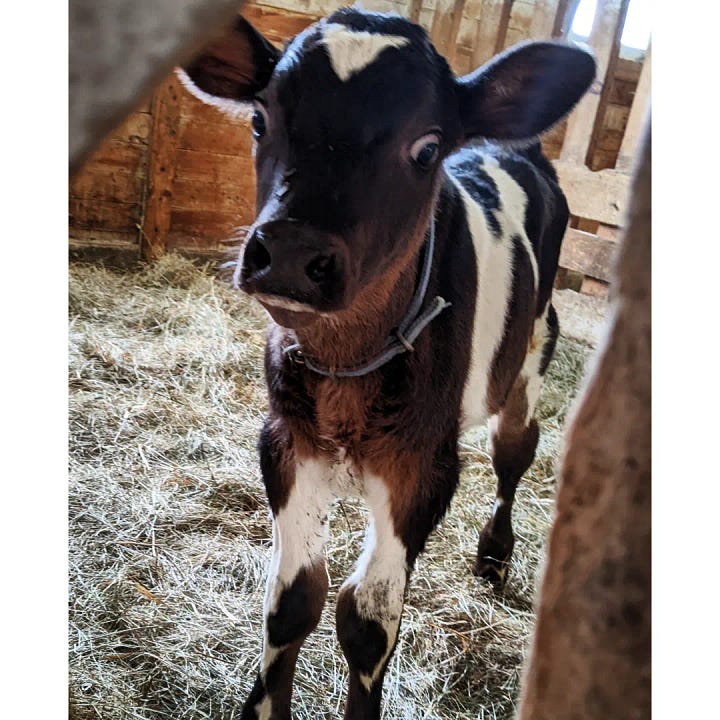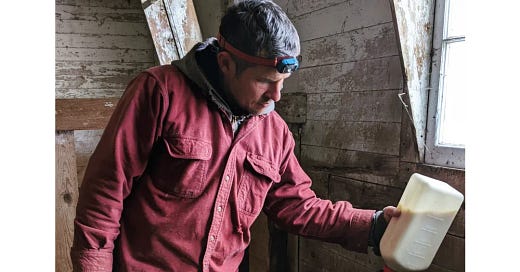

Greetings Neighbors and Strangers,
This weekly email arrives bearing the following title: “The Peasantry School Newsletter: Stories about disentangling food and feeding from the market.” But what is the Peasantry School? Who are the teachers and who are the students? And who the heck would want to study peasantry (peasanting?) when modern life offers so many undeniable benefits? Are you using the word “peasant” to avoid calling it a school for a recovering European American indigeneity? How much does the tuition cost?
In this newsletter, I will attempt to answer these questions by inviting you to join me for one of the following Peasantry School offerings:
The Gratitude Feast Immersion: A five-day, whole-body soak in the experimental food-gifting and community-building work of Sand River Community Farm. Residential session dates: 5/28-6/2, 7/2-7/7, 7/30-8/4, 8/27-9/1, 10/1-10/6. Find description below.
The first Gratitude Feast of the season is offered as a gift to anyone who is hungry for any reason. Sunday May 5th beginning at 3:30 pm, followed by an old-fashioned barn dance. Address at the bottom of this email. Please arrive promptly.
Peasantry School Community Call with Michael Reynolds of the Roimata Food Commons in New Zealand: Friday 5/10 at 3:00 pm Eastern Daylight Time. In a short video about Michael’s efforts to turn a city park into a neighborhood food forest, the interviewer asks him what it requires for someone to undertake such a radical endeavor. Michael replies, “Passion.” And then, after a pause, “And perhaps a healthy dose of stubbornness.” When I first heard Michael speak a few weeks back, I immediately caught a whiff of the way home. I can’t wait to share some of his stories with you. ZOOM LINK
Gift Economy: How Does it Work? An interview with Adam Wilson and Sam Bliss for the podcast Finding Wilder. PODCAST LINK This was a first for me, to discuss the work here at the Peasantry School in long-form. I offer my thanks to Micayla Jean for imagining that Sam and I might have a few stories worth telling about the magic that happens when food is turned back into a gift.
What is The Peasantry School? An invitation.
The Peasantry School is just a story. But this story doesn’t lay out a plan for restructuring the food system or overthrowing the market. It doesn’t promise to heal our broken relationship with that part of us we call “Nature.” In fact, this story doesn’t have anything figured out at all. This simply isn’t a victory story.
This story begins, instead, with a grief song.
Imagine cancelling your insurance policies, quitting your day job and dispersing your savings. You look around and wonder whether the neighbors have any vested interest in keeping you alive, and whether you possess the capacity to grant them life in return. It sounds a bit like a trust fall—into the landscape you might just begin to call home. Your very rational fear that there will be no one out there to catch you when you fall—that is the melody to the grief song. The harmony sounds like this: “You’re probably right to imagine that I can’t be trusted to catch you. But I am willing to try to learn.”
A bone-deep longing to become a trustworthy neighbor—to humans and nonhumans alike—sets the course of study at The Peasantry School.
With some regularity a friend or neighbor, upon reading Robin Wall Kimmerer’s Braiding Sweetgrass, says to me, “Have you read it Adam? I feel like I am reading your newsletters.” Now, that is a compliment.
I can still remember the book shop where I purchased Braiding Sweetgrass on my way to the ferry on the far West coast of this continent. I had thousands of miles of travel ahead of me, ample time for the story-medicine carried in the book to slowly infiltrate this human body—adrift in the world, longing for home.
A few days later I lay in the loft bed of the cabin I’d just built and moved into, feeling the book’s remaining pages dwindle between the fingers of my right hand. Arriving in uncanny unison, the house and the book marked the end of one chapter and the beginning of the next, and I could feel it. But darn if that’s not a frightening place to train your gaze, upon the blank and silent page before the next chapter of the story called “your life” begins.
In the book’s final pages, Robin describes a tribal ceremony called the dance of the giveaway wherein participants cover a blanket in the center of the circle with gifts. It would be a couple of years before I began using the terms “reckless generosity” and “voluntary impoverishment” to describe the food gifting work that lay ahead for me. “The ceremonial giveaway is an echo of our oldest teachings,” Robin writes. “Generosity is simultaneously a moral and material imperative, especially among people who live close to the land…where the wellbeing of one is linked to the well-being of all.” If we hoard the gift, she warns, “we become constipated with wealth, bloated with possessions, too heavy to join the dance…both the honor of giving and the humility of receiving are necessary halves of the equation.”
When my neighbors asked me what it would mean to have a Farm where everything is offered as a gift to anyone who is hungry for any reason, charity surfaced as the only readily-available frame of reference. “How are you going to get the food to the people who really need it?” they would ask.
“I’m not going to. How would I know who needs the gift most?” That answer did little to quell the confusion. Finally, I found a more honest answer to the charity question:
The work of the Farm is not to help poor people get rich, but rather to invite rich people to consider voluntary impoverishment as a moral, even a joyful choice in a time of cascading ecological and social troubles.
“Both the honor of giving and the humility of receiving are necessary,” Robin writes. The humility of receiving would prove a much harder pill to swallow. Reckless generosity didn’t feel so difficult until I noticed that joining the giveaway immediately left me with less material security. The word “poverty” means simply, “a state of having few or no possessions.” Voluntary impoverishment would ask me to trade possessions for relations, control for courtship, autonomy for community, dominion for affection. Robin writes:
Our elders say that ceremony is the way we can remember to remember. In the dance of the giveaway, we remember that the earth is a gift that we must pass on, just as it came to us. When we forget, the dances we will need will be for mourning. For the passing of polar bears, the silence of cranes, for the death of rivers and the memory of snow.
What happens once I acknowledge that my people have been in the business of forgetting to remember for so many generations now that my inheritance includes more amnesia than anything else? I stand at a fork in the road. I could curse the people I come from for bestowing such cultural poverty upon me. Or I could imagine that, despite all the rupture, the old people still have access to memories preserved and passed down as stories from a time when our people had a greater capacity to make home in the world—by living in mutually sustaining relationships with their human and nonhuman neighbors. I could begin to plant some of those stories as seeds into the soil at my feet.
This type of story-planting makes up the day-to-day work at the Peasantry School. Some of those stories include cultural techniques for growing and preserving food: how much salt is required to make sauerkraut, or to season slow-roasting lamb? Others include practices of radical hospitality, neighborly care and intergenerational table fellowship: is it better to welcome someone to the neighborhood with a pie or a plate of cookies? As a person of European descent, I found that the path back to the land begins by turning to face an ancestry that would be much easier to walk away from.
Gifts bestow forgiveness upon their recipient, be they parent, sibling, neighbor, elder, ancestor, or stranger. But the humility of receiving a gift means accepting the forgiveness it carries, both from the human who places it in your hands and from the earth of its begetting. Receiving forgiveness is a surprisingly demanding practice. Once forgiven, the excuses begin to fall away.
So, what is the Peasantry School?
A place where we long to remember our deeply human capacity for mutually sustaining relationships, both human to human and human to all that is not human.
Who are the teachers and who are the students?
Each session will be hosted by the nonhumans who uphold life on this windy hilltop Farm above a lazy bend in Sand River. Adam will serve as the principle human host, joined by special guest cohosts for each session. The shared study will include the labor of planting, harvesting, cooking, serving, singing and giving thanks, culminating with Sunday evening’s Gratitude Feast: a grand community supper followed by a barn dance.
Who the heck would want to study peasantry when modern life offers so many undeniable benefits?
Admittedly, a degree of heartbreak is required to undertake such a materially unpromising endeavor.
Are you using the word “peasant” to avoid calling it a school for a recovering European American indigeneity?
A recovering capacity for home seems to require learning the conditions under which such a capacity was—and is ongoingly—broken. The Gratitude Feast Immersion will include suggested readings in preparation for the session.
How much does the tuition cost?
The Gratitude Feast Immersion, which includes simple lodging at the Farm and all meals for the duration of your stay, is offered as a gift. People of all stripes are invited to sustain the Farm ongoingly in creative ways that might include contributing to the Farm’s annual budget request. If enough people figure out how to keep the Farm and School in mind, they will continue their work in the world.
Contact Adam with questions or interest at peasantryschool@gmail.com.
Many thanks to you.
Adam




Morning tears arrive while reading this. I will be finding a copy of Braiding Sweetgrass to read, and send gratitude to you for all you are doing… your generosity ripples out far and wide. Thank you Adam.
I’d be there with bells on if I could Adam!
❤️❤️❤️